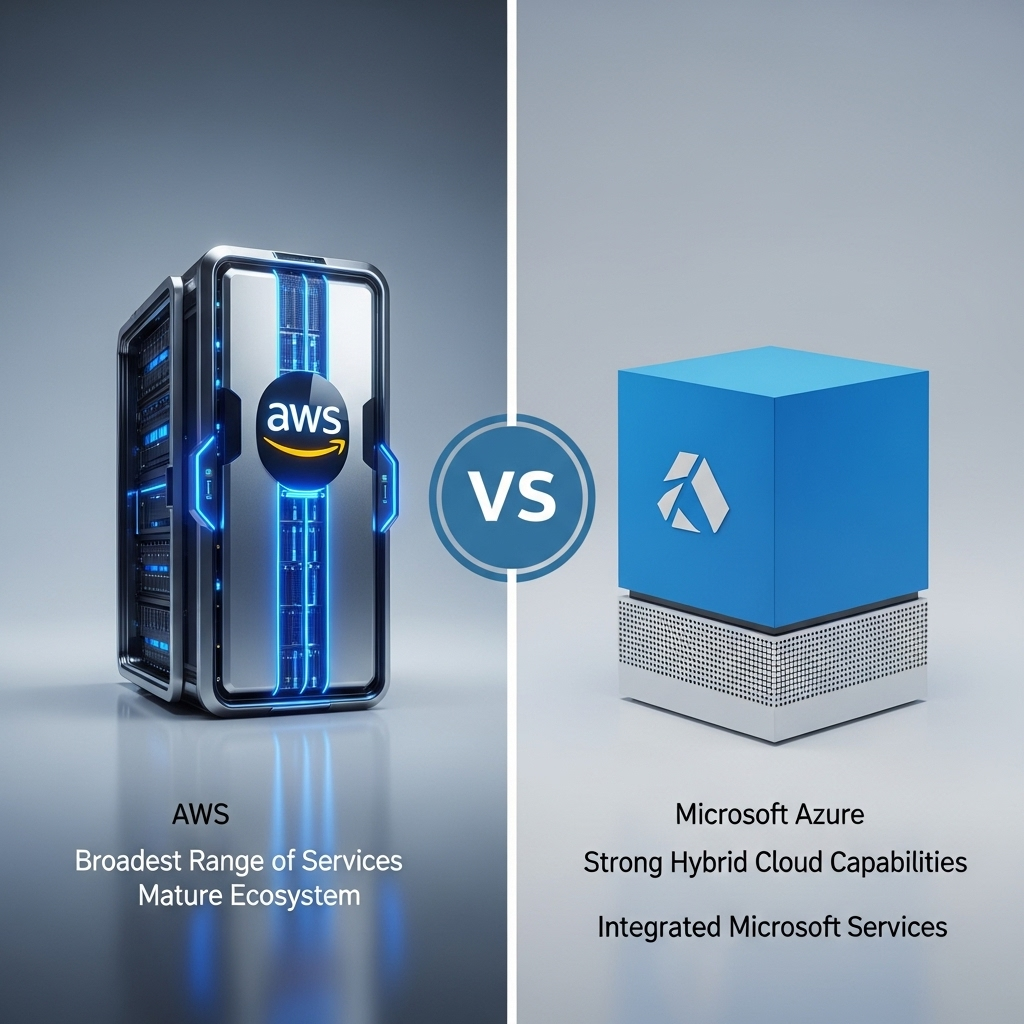Cloud service providers: Amazon Web Services (AWS) vs. Microsoft Azure
Quick Verdict
Both AWS and Azure are robust cloud platforms with different strengths, catering to diverse needs and use cases.
- AWS offers a vast global infrastructure with a wide range of services and mature AI/ML capabilities through SageMaker.
- Azure provides strong support for hybrid cloud environments with Azure Arc and a comprehensive suite of DevOps tools.

Key features – Side-by-Side
| Attribute | Amazon Web Services (AWS) | Microsoft Azure |
|---|---|---|
| Compute Services | Elastic Compute Cloud (EC2) provides virtual servers (instances) with a variety of operating systems, software packages, and instance types. | Virtual Machines (VMs), Virtual Machine Scale Sets, Azure App Service, Azure Functions, Azure Container Instances, Azure Kubernetes Service (AKS), Azure Batch, Azure Dedicated Hosts |
| Storage Options | Simple Storage Service (S3) for object storage. | Blob Storage (Hot and Cool tiers), File Storage, Queue Storage, Table Storage, Disk Storage (Standard HDD, Standard SSD, Premium SSD, Ultra Disk) |
| Database Offerings | AWS Relational Database Service (RDS) simplifies the setup, operation, and scaling of relational databases in the cloud. RDS supports various database engines, including Amazon Aurora, PostgreSQL, MySQL, MariaDB, Oracle Database, and SQL Server. | Azure SQL Database (serverless compute tier) |
| AI/ML Services | AWS SageMaker is a fully managed platform that enables developers and data scientists to build, train, and deploy machine learning (ML) models at scale. | Azure Cognitive Services, Azure Machine Learning, Azure AI Infrastructure |
| Serverless Computing | AWS Lambda is a serverless computing service that lets you run code without managing servers. | Azure Functions, Azure Logic Apps |
| Security Features and Compliance | AWS has strong security features, including encryption, identity and access management (IAM), and network security. AWS complies with various industry-specific regulations and standards, such as PCI DSS, HIPAA, GDPR, and FedRAMP. | Azure Active Directory (Azure AD), Azure Policy, Azure Blueprints, Azure Firewall, Azure Security Center, Microsoft Purview, Compliant with HIPAA, GDPR, ISO 27001, FedRAMP, and SOC 1/2/3 |
Overall Comparison
Infrastructure: AWS has a larger global presence; AI/ML: AWS SageMaker is well-established; Hybrid Cloud: Azure Arc provides strong hybrid support
Pros and Cons
Amazon Web Services (AWS)
Pros:
- Scalability
- Security
- Performance
- Fault tolerance
- High availability
- Vast global infrastructure
- Compliance with various industry standards
- Comprehensive AI/ML services with SageMaker
- Integration with on-premises infrastructure via AWS Outposts
- Tools for managing and deploying Lambda functions (SAM, CloudFormation)
- Cloud-native development environment (AWS Cloud9 IDE)
- Cost control through Amazon CloudWatch
Cons:
- No major disadvantages reported.
Microsoft Azure
Pros:
- Scalable infrastructure
- Flexible storage solutions
- Comprehensive AI/ML tools
- Robust security framework
- Hybrid cloud environment support (Azure Arc)
- Serverless computing options
- Suite of DevOps tools
- Global network of data centers
- Various pricing options
- Detailed compliance documentation
Cons:
- Cost estimation requires considering specific services
- Evaluate customer service and support offerings to determine which aligns best with your needs
- Consider the migration tools and services offered by each provider, and how easy it is to migrate existing applications and data to their respective platforms
User Experiences and Feedback
Amazon Web Services (AWS)
What Users Love
- No highlights reported.
Common Complaints
- No major complaints reported.
Value Perception
- No value feedback reported.
Microsoft Azure
What Users Love
- Well-suited for hybrid cloud environments
- Streamlines building, training, and deploying machine learning models at scale
- Allows developers to execute event-triggered functions without managing servers
- Serverless architectures automatically scale as demand grows
Common Complaints
- No major complaints reported.
Value Perception
- Azure Pricing Calculator can help estimate costs based on specific requirements
- Azure Arc service allows businesses to manage resources across on-premises, multi-cloud and edge environments
- Azure DevOps provides a suite of tools for planning, developing, testing, and deploying applications
- Visual Studio Code, with its Azure DevOps extension, enables developers to manage pull requests, review code, and track work items directly from the editor
- Azure Network Watcher monitors deployed Azure networking services
- Azure Cost Management and Billing helps analyze, manage, and optimize Azure costs